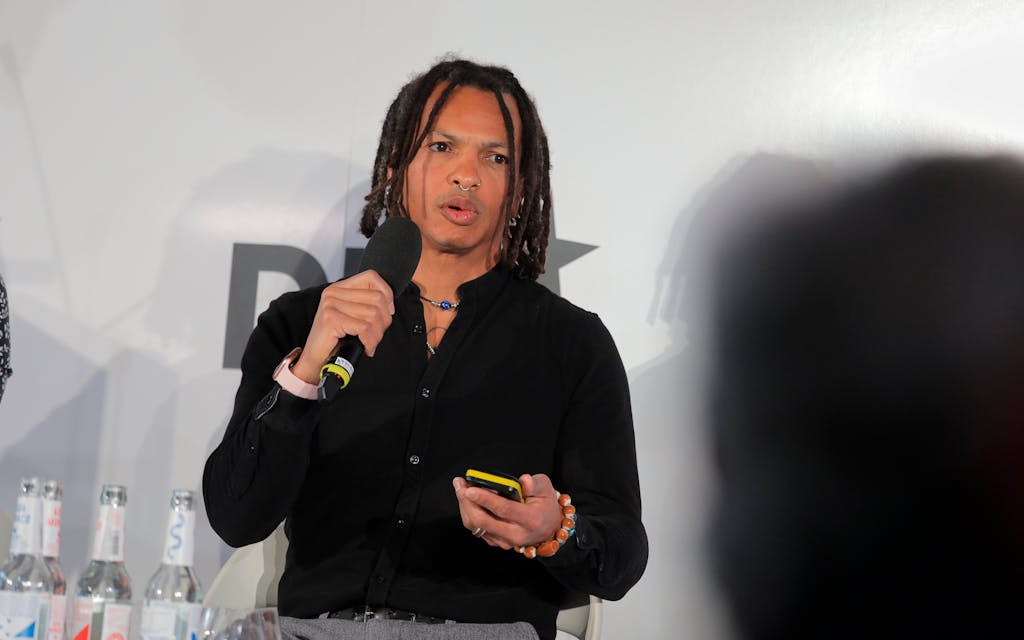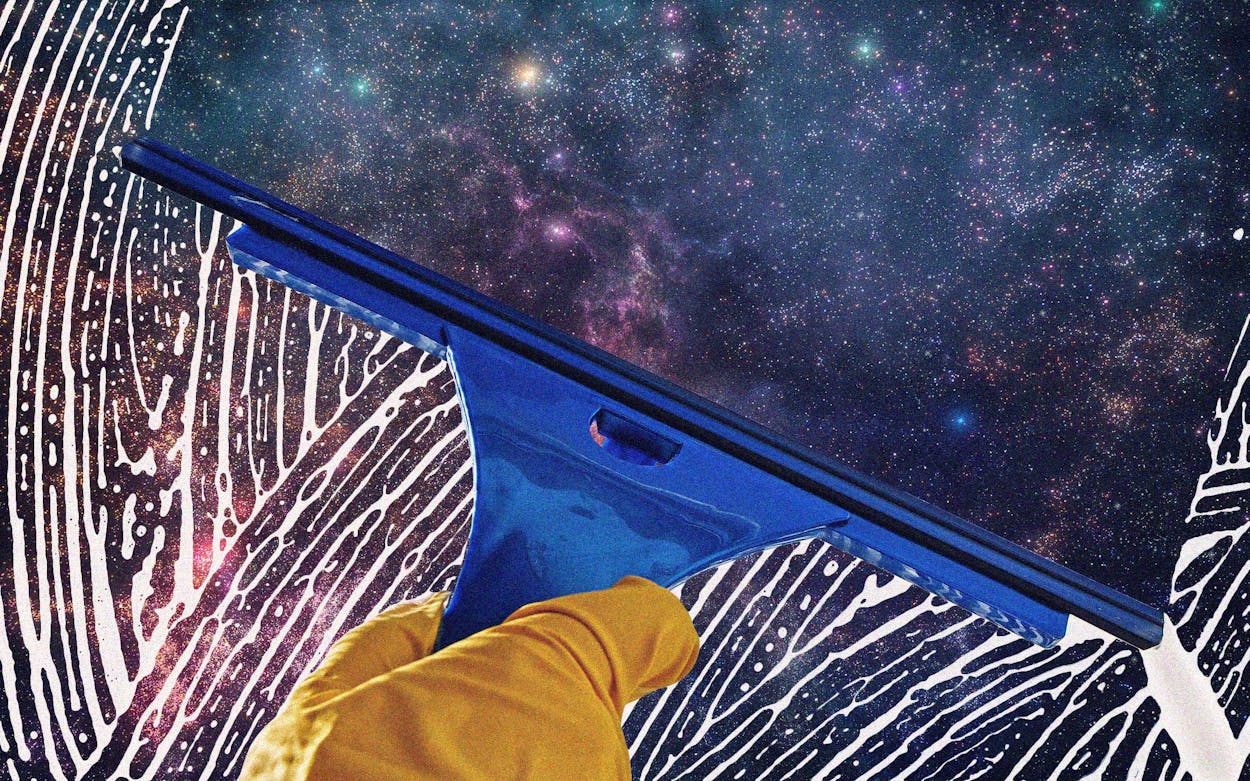You might not look at Moriba Jah’s nose ring, dangling earrings, tattoo sleeves, rainbow-tinted sunglasses, or shirtless selfies on Twitter showing a ripped runner’s body, and think: this looks like a man who loves burying himself in data. “I’m not a traditional academic by any stretch of the imagination,” Jah told me on the patio of a French gastropub just before Thanksgiving, over an afternoon glass of champagne. “Cheers.”
Jah is a University of Texas at Austin associate professor and astrodynamicist who studies the movements of the ever-increasing amount of debris in Earth’s orbit and the threats that debris poses to satellites and astronauts. Said more simply: Jah is an expert in space junk. Actually, he’s the expert in space junk, having recently been hired by Apple cofounder Steve Wozniak to serve as chief space consultant at a company called Privateer, which has pledged to create a “Google Maps of space” that’ll detail the millions of objects dangerously whizzing around Earth.
Between bites from a small plate of peau de poulet (chicken skin), Jah recalled an experience he had six years ago that made him into something of an evangelist for the cause of cleaning up outer space. On a trip to Anchorage, Alaska, with his son in 2015, Jah said he woke up one morning, “and I felt a presence around me. This presence felt very old, and a wave of sadness basically rushed across me, and in my mind’s eye, I could see the human story from eons ago till now.” That story began with responsible stewardship of the Earth and ended with negligence. Jah returned to Maui, where he’d lived since 2006, tracking threats to military satellites for the Department of Defense, and began referring to himself as a “space environmentalist.” He began giving speeches and TED talks to spread the word about the dangers of the junk we’ve left behind just outside our atmosphere.
Unsurprisingly, then, Jah was mystified by Russia’s decision to fire a missile at one of its own satellites in mid-November, an act that created hundreds of thousands of tiny chunks and prompted fears over the safety of the International Space Station crew as the station zipped through the resulting debris field at more than 17,000 miles per hour. “It’s a bit crazy and clearly the Russians know better,” the fifty-year-old Jah said with a simmering intensity. “The number of un-trackable objects that are hazards has increased. There’s nothing but detriment to the near-Earth orbit ecosystem as a result of blowing up stuff.” More space junk was bad, period—a notion the public is beginning to understand with each alarming news flash.
As anyone who may have checked out his Twitter account might assume, Jah came to his field on an unconventional path. Born in San Francisco in 1971 to a Haitian mother and Sierra Leonean father, Jah spent his formative years in Venezuela before returning to the United States, where he enlisted in the Air Force and wound up guarding nuclear-weapon sites in Montana. There, during his night shifts, he’d see dots of light going across the sky and wonder, “What the hell was that?”
But it wasn’t until that trip to Anchorage that his observation became a mission. When he first started giving TED talks on the subject, he said the general reaction was, “Who is this dude? Space environmentalism—what?”

By this point, however, he was accustomed to outsider status. In a 2016 TEDx talk, he wore a military-style jacket with bling buttons and white-rope embroidery and started the presentation with the line, “No, we [astrodynamicists] all don’t wear what I’m wearing right now.” And in 2017, when he first came to UT-Austin to work at the world-renowned Oden Institute for Computational Engineering and Sciences (and where he was the university’s first Black aerospace engineering professor), he used unconventional thinking and government seed money to create AstriaGraph, the first crowdsourced database that tracks space objects and predicts their trajectories.
AstriaGraph monitors space debris’ locations, speed, countries of origin, sizes, shapes, and material properties. Crucially, the program’s algorithms predict objects’ behavior. Jah also took AstriaGraph way outside traditional astrodynamics, looking at the observations of social scientists and legal analysts to predict what countries might put into space and how those things might also move about. “I definitely feel like I’m out on a limb,” he said. “I feel that my perspective is one that has merit to it, but I think that it’s a pretty lonely place for me.”
If the moments of validation are few and far between, they are increasingly meaningful. In February 2021, Alex Fielding, an engineer who started his career at Apple and cofounded Privateer, called Jah and asked him, according to Jah, “Hey, do you have an hour to just let me pick your brain? I just want to ask you a lot of questions about space, situational awareness, and all these things.” The two met over the phone for an hour, and a few months later, Fielding called again to say that he and Wozniak wanted Jah to provide technical direction and hire employees for Privateer, which was, at that time, operating in “stealth mode” and unknown to most.
The Privateer plan is to accumulate the most accurate readings on space debris by purchasing some data, crowdsourcing other data, and launching the company’s own fleet of satellites. Jah called Privateer a “decision intelligence platform” that will help people who put things into orbit to do so more responsibly. Some of its data will be free for research, but ultimately, Privateer envisions profits from companies that can afford to pay for information.
You might think that anyone with a satellite would have an interest in flying objects that could damage their expensive equipment and knock out cell phone or TV streaming services. But debris isn’t yet knocking off components at an alarming rate, and many companies are accepting the risk rather than paying to clean up space trash. Jah told me that could change, in time.
Privateer’s first satellite will launch early next year, with additional satellites to come. Jah’s hope is that the tracking will result in salvage laws for space, like bounty rewards for cleanup. But that’s just short-term. Looking further into the future, if space travel becomes crucial to humankind’s survival, escaping our own orbit would require that we don’t get shredded to pieces by what could become an impenetrable layer of debris if not cleaned up.
“If we haven’t figured out how to thrive around another star, then humanity’s story ends at that point. So, to me, it’s critical that we find a way to explore other solar systems,” Jah said, brushing crumbs from his fingertips as he prepared to leave the restaurant. Though he hopes we don’t carry with us, when we do, our all-too-typical notions of natural resources as disposable. “If we carry our current mentality, which is very viral and self-defeating, then I don’t want that to spread across the universe.”








